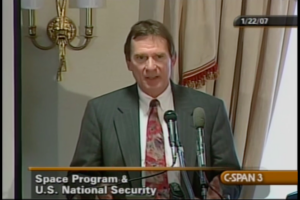STRATCOM Raises Spectre Of Offensive War In Space
Posted on

Gen. John Hyten
SPACE SYMPOSIUM: Offensive war in space is one of the truly hot button defense policy issues. Advocates say it is inevitable. Opponents say it violates the ideal of a cosmos marked for exploration and peaceful coexistence. Some say war in space would violate the Outer Space Treaty, which bars nuclear weapons and other weapons of mass destruction from being stationed in space, as well as generally discouraging the weaponization of space.
Gen. John Hyten, head of Strategic Command, raised the question again during a hearing Tuesday before the Senate Armed Services Committee. (Tidbit: Hyten penned a piece when he was a colonel titled: “A Sea of Peace or a Theater of War? Dealing with the Inevitable Conflict in Space” — note the “inevitable”). Then Bob Work, Deputy Defense Secretary, added fuel to the policy fire with remarks in a classified briefing here today
When asked by Sen. Ted Cruz about Russian work on anti-satellite weapons, Hyten said the United States must “have the ability to defend” against those threats and “build an offensive capability to challenge” theirs, according to my colleague Marcia Smith, who covered the hearing in Washington.
Speaking this morning here, Hyten said during the Q and A session ” the most important thing we have to do in space is deal with the threat.” That doesn’t seem to lessen the focus on warfighting in space, though we can hear him adding that we aren’t thinking about war in space but war that extends to space.
Here’s what Work said during his classified session yesterday, according to an email from his Pentagon spokeswoman.
“Space control capabilities should be considered to ensure survivable and resilient space operations necessary for the execution of war plans and the defense of our Allies…. While we rely heavily on space capabilities, in both peace and war, we must continue to emphasize space control as challenges arise.” Those comments are very similar to those Work made in a classified session here two years ago, as Breaking D readers know.

Robert Work
Asking The Experts
Because this is such a charged policy issue and it’s not always clear exactly what senior defense officials really mean, I reached out to some of the most experienced experts on the topic to get some insights.
Brian Weeden, a former missileer who works for the Secure World Foundation, pinged several sources here and offered this analysis of Hyten’s comments: “What he’s talking about is a US offensive capability to defeat ASAT attacks on US satellites, not a US offensive capability to attack Russian/Chinese satellites. That’s a subtle, but important difference.” Note that, either way, there appears little doubt Hyten is talking about offensive capabilities.

Theresa Hitchens
Theresa Hitchens, a longtime space analyst who is now a scholar at the Center for International and Security Studies at Maryland (CISSM), was surprised by what Hyten said. “Gen. Hyten’s comments are a perfect example of the delicacy of diplomacy, and the dangers of rhetoric in a relative vacuum,” she said. “Taken in context of his earlier statements and those of the Pentagon civilian leadership, as well as statements by aides familiar with his remarks, Hyten’s use of the word ‘offense’ was meant to establish a U.S. intention to develop and use military force against Chinese counterspace capabilities, such as anti-satellite weapons… (but his) actual words were ambiguous and could be interpreted on their face as referring to U.S. plans to attack Chinese satellites with U.S. ASAT capabilities — a strategy that has not been up to now publicly embraced by the U.S. government, and could be seen as escalatory in nature.”
“This highlights the need for clarity in U.S. policy and strategy, as well as for improved dialogue with China and Russia as well as allies about U.S. strategic bright lines and responses.,” Hitchens said.
Bob Butterworth, a member of the Breaking Defense Board of Contributors and one of the country’s most respected space experts, believes “the problem is miscast in these discussions, leading people to worry about explosive arms races in space.”

Bob Butterworth
First, Butterworth says, “Space was never the oft-touted peaceful zone protected by Soviet and American recognition of mutual interests. The first US reconnaissance satellites carried radar warning receivers; nuclear-armed ASAT launchers were deployed during the 1960s and maintained for I-don’t-remember how long; the USSR and the US both demonstrated kinetic orbital interceptors during the 1980s; (and) because a satellite could be destroyed by collision with another satellite, no matter what its mission, nearly anything in orbit could be a space ‘weapon.’
“‘Ability to defend’ is only one of at least four approaches that can be chosen in response to offensive threats. One can also try redundancy, robustness, and invisibility,” Butterworth wrote.
“War in space is important in its effects on the terrestrial war. No other country uses space in the joint fight as thoroughly as we do. So it’s probably a losing proposition to try to deter offensive action against our national security satellites by threatening to attack the satellites of the offensive party,” he said: No one else has as much to lose in space as we do, so threatening to the escalate the conflict isn’t much of a deterrent.
Nor is an adversary likely to blunder into space war out of a miscalculation, he added: “The offensive party will undoubtedly be aware of the importance of our space systems to our terrestrial fighting capability, which suggests that an intentional attack on our national security satellites would be an intentional act of war.”
Joan Johnson Freese, a professor at the Naval War College and expert on Chinese and US military space, said she was “a bit surprised, as I had been hopeful that Hyten was changing his rhetoric, and policy, based on his remarks at Stanford earlier this year basically urging deterrence. Saber rattling is never useful. More often than not it is counterproductive.”
What’s clear here from conversations I’ve had with several Air Force officers is that the likelihood of offensive warfare in space is close to becoming an accepted doctrine and is viewed by them as likely, just as Col. Hyten wrote in his piece. But the policy debate about whether and how is still unsettled — at least in the public realm.
Subscribe to our newsletter
Promotions, new products and sales. Directly to your inbox.
